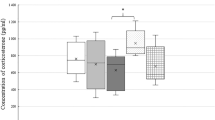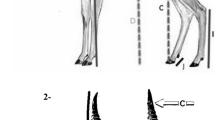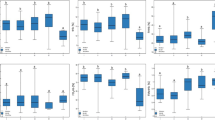Abstract
CATTLE bloods were examined at intervals during the course of the day at Kabete, Kenya, altitude 6,300 ft., the maximum temperature at the season of the experiment being greater than 75° F., the minimum less than 52° F. The cattle were Zebu/European cross. Water was given them at one point while the experiments were in progress but did not affect the results. Blood was drawn from the jugular vein into oxalated tubes, prepared according to Wintrobe1. The neck was constricted with a rope while the vein was entered, but released while the blood sample was being drawn. Blood was drawn at hourly intervals between 9.0 a.m. and 3.0 p.m.
This is a preview of subscription content, access via your institution
Access options
Subscribe to this journal
Receive 51 print issues and online access
$199.00 per year
only $3.90 per issue
Buy this article
- Purchase on Springer Link
- Instant access to full article PDF
Prices may be subject to local taxes which are calculated during checkout
Similar content being viewed by others
References
Wintrobe, P. Maxwell, “Clinical Hematology”, 218 (London: Henry Kimpton, 1946).
Lichtman, S. S., “Diseases of the Liver, Gall Bladder and Bile Ducts”, 106 (London: Henry Kimpton, 1949).
Author information
Authors and Affiliations
Rights and permissions
About this article
Cite this article
T.-W.-FIENNES, R. Diurnal Variations in the Blood Picture of Cattle. Nature 170, 934–935 (1952). https://doi.org/10.1038/170934a0
Issue Date:
DOI: https://doi.org/10.1038/170934a0
Comments
By submitting a comment you agree to abide by our Terms and Community Guidelines. If you find something abusive or that does not comply with our terms or guidelines please flag it as inappropriate.



